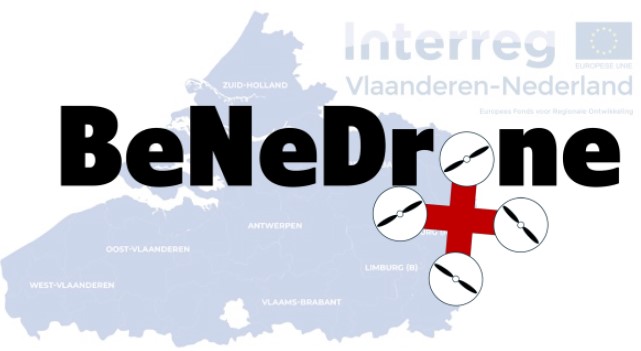Projects
BeNeDrone

The BeNeDrone (Belgium Netherlands Drone) project, supported by Interreg, aims to dynamically map the medical and economic consequences of the use of medical drones for safety and emergency help services in the light of the applicable national and international legislation.
The aim of the project is to develop concrete solutions (digital models) that help to implement the rules applicable to drones.
This will support the design of protocols that can follow the business community and are drawn up or controlled by organizations involved in the implementation of the rules on drones.
The products/outcomes of the project offer a joint framework and objectification for parties involved, incl. Care providers/users, regulations/enforcement, realizing SMEs/industry.
The developed models and algorithms and the way of applying can be building blocks for later automatic route planning that takes into account different sets of regulations (countries) and can anticipate dynamic conditions.
STEADFAST
STEADFAST – Swarm Technology Enabling Advanced Drone-Facilitated Active Support Tactics for Military and First Responder Operations
The STEADFAST project aims to enhance situational awareness in military and civil scenarios with the help of human-swarm teams (HST) that can be deployed in a resilient and responsible manner, collecting, and sharing real-time information in complex missions in non-permissive environments. In time-sensitive tactical situations where SA is of paramount importance and human operators deal with high cognitive demands,
(semi-)autonomous energy-efficient tiny-drone swarms can collect data fast, from various vantage points and at low altitudes even in a Global Navigation Satellite System (GNSS)-denied environment. The project examines novel neuromorphic interpretation methods of visual event data collected by dynamic vision sensors methods that have the potential to improve energy efficiency of HST (Human Swarm Teaming) while increasing execution speed. Training of the systems includes cognitive load data of human operators and involves different simulated scenarios in urban settings including hostile events. The intended outcome of the project that will be developed in co-creation with end users is to provide a roadmap for the development and use of HST systems with flexible and adaptive autonomy to be adopted in military and civil fast-response scenarios under conditions that are satisfactory from an operational, ethical, and legal perspective, and to provide educational and training tools that ensure organizational acceptance and effective organizational implementation.

Consortium
Kol. Remco Bastiaan - Air & Space Warfare Center (cofinancier)
Kol. Ir. Vincent Lengkeek - Royal Netherlands Airforce (cofinancier)
Maj. Herwin Meerveld - Transition Team Defence Helicopter Command (cofinancier)
Bram Oostvogel - SOFWORX (cofinancier)
Rudy Muller - Dutch Drone Centre (cofinancier)
Dr. Manolis Sifalakis - IMEC (cofinancier)
Bob Moll - Robin Radar Systems (cofinancier)
prof. ir. Jan Laarhuis - Thales (cofinancier)
Ing. Zbynek Sedivý - Czech Aerospace Centre (cofinancier)
ir. Arnaut de Jong - Delft Dynamics (cofinancier)
ir. Kirsten Drost - Science [&] Technology (cofinancier)
dr. Cor Veenman - TNO (cofinancier)
dr. Judith Dijk - TNO (cofinancier)
Martijn Hädicke - Robotics and Autonomous Systems Netherlands Army (collaborative partner)
prof. dr. Martijn Kitzen - FMW NLDA (collaborative partner)
prof. dr. Lonneke Peperkamp - FMW NLDA (collaborative partner)
Kol. dr. Vincent Stirler - Defence Health Organisation, Radboud UMC (collaborative partner)
Col. dr. Jan Farlík - Air Defence C2 Group, University of Defence, Czech Republic (collaborative partner)
Jelle Cloïn - Living Lab Neurochirurgie (collaborative partner)
René Thaens - NATO Communications and Information Agency (collaborative partner)
Cristian Coman - NATO Communications and Information Agency (collaborative partner)
ir. Marcel van Witzenburg - Netherlands Aerospace Center (collaborative partner)
Marc Spijker - KH Engineering (collaborative partner)
Eugene Martina - Siemens (collaborative partner)
ir. Rob van Nieuwland - UAV+ (collaborative partner)
Petra van Dijk - MindLabs (collaborative partner)
